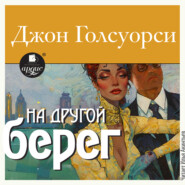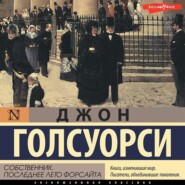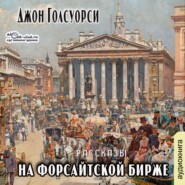По всем вопросам обращайтесь на: info@litportal.ru
(©) 2003-2024.
✖
The Forsyte Saga - Complete
Настройки чтения
Размер шрифта
Высота строк
Поля
Windows that summer were open all day long, and all night too, and day and night the scents of flowers and trees came in, the hot scent of parching grass, and the cool scent of the heavy dews.
To the eye of the observant Dartie his two guests did not appear to be making much running, standing there close together, without a word. Bosinney was a hungry-looking creature — not much go about him.
He left them to Winifred, however, and busied himself to order the dinner.
A Forsyte will require good, if not delicate feeding, but a Dartie will tax the resources of a Crown and Sceptre. Living as he does, from hand to mouth, nothing is too good for him to eat; and he will eat it. His drink, too, will need to be carefully provided; there is much drink in this country ‘not good enough’ for a Dartie; he will have the best. Paying for things vicariously, there is no reason why he should stint himself. To stint yourself is the mark of a fool, not of a Dartie.
The best of everything! No sounder principle on which a man can base his life, whose father-in-law has a very considerable income, and a partiality for his grandchildren.
With his not unable eye Dartie had spotted this weakness in James the very first year after little Publius’s arrival (an error); he had profited by his perspicacity. Four little Darties were now a sort of perpetual insurance.
The feature of the feast was unquestionably the red mullet. This delectable fish, brought from a considerable distance in a state of almost perfect preservation, was first fried, then boned, then served in ice, with Madeira punch in place of sauce, according to a recipe known to a few men of the world.
Nothing else calls for remark except the payment of the bill by Dartie.
He had made himself extremely agreeable throughout the meal; his bold, admiring stare seldom abandoning Irene’s face and figure. As he was obliged to confess to himself, he got no change out of her — she was cool enough, as cool as her shoulders looked under their veil of creamy lace. He expected to have caught her out in some little game with Bosinney; but not a bit of it, she kept up her end remarkably well. As for that architect chap, he was as glum as a bear with a sore head — Winifred could barely get a word out of him; he ate nothing, but he certainly took his liquor, and his face kept getting whiter, and his eyes looked queer.
It was all very amusing.
For Dartie himself was in capital form, and talked freely, with a certain poignancy, being no fool. He told two or three stories verging on the improper, a concession to the company, for his stories were not used to verging. He proposed Irene’s health in a mock speech. Nobody drank it, and Winifred said: “Don’t be such a clown, Monty!”
At her suggestion they went after dinner to the public terrace overlooking the river.
“I should like to see the common people making love,” she said, “it’s such fun!”
There were numbers of them walking in the cool, after the day’s heat, and the air was alive with the sound of voices, coarse and loud, or soft as though murmuring secrets.
It was not long before Winifred’s better sense — she was the only Forsyte present — secured them an empty bench. They sat down in a row. A heavy tree spread a thick canopy above their heads, and the haze darkened slowly over the river.
Dartie sat at the end, next to him Irene, then Bosinney, then Winifred. There was hardly room for four, and the man of the world could feel Irene’s arm crushed against his own; he knew that she could not withdraw it without seeming rude, and this amused him; he devised every now and again a movement that would bring her closer still. He thought: ‘That Buccaneer Johnny shan’t have it all to himself! It’s a pretty tight fit, certainly!’
From far down below on the dark river came drifting the tinkle of a mandoline, and voices singing the old round:
‘A boat, a boat, unto the ferry, For we’ll go over and be merry; And laugh, and quaff, and drink brown sherry!’
And suddenly the moon appeared, young and tender, floating up on her back from behind a tree; and as though she had breathed, the air was cooler, but down that cooler air came always the warm odour of the limes.
Over his cigar Dartie peered round at Bosinney, who was sitting with his arms crossed, staring straight in front of him, and on his face the look of a man being tortured.
And Dartie shot a glance at the face between, so veiled by the overhanging shadow that it was but like a darker piece of the darkness shaped and breathed on; soft, mysterious, enticing.
A hush had fallen on the noisy terrace, as if all the strollers were thinking secrets too precious to be spoken.
And Dartie thought: ‘Women!’
The glow died above the river, the singing ceased; the young moon hid behind a tree, and all was dark. He pressed himself against Irene.
He was not alarmed at the shuddering that ran through the limbs he touched, or at the troubled, scornful look of her eyes. He felt her trying to draw herself away, and smiled.
It must be confessed that the man of the world had drunk quite as much as was good for him.
With thick lips parted under his well-curled moustaches, and his bold eyes aslant upon her, he had the malicious look of a satyr.
Along the pathway of sky between the hedges of the tree tops the stars clustered forth; like mortals beneath, they seemed to shift and swarm and whisper. Then on the terrace the buzz broke out once more, and Dartie thought: ‘Ah! he’s a poor, hungry-looking devil, that Bosinney!’ and again he pressed himself against Irene.
The movement deserved a better success. She rose, and they all followed her.
The man of the world was more than ever determined to see what she was made of. Along the terrace he kept close at her elbow. He had within him much good wine. There was the long drive home, the long drive and the warm dark and the pleasant closeness of the hansom cab — with its insulation from the world devised by some great and good man. That hungry architect chap might drive with his wife — he wished him joy of her! And, conscious that his voice was not too steady, he was careful not to speak; but a smile had become fixed on his thick lips.
They strolled along toward the cabs awaiting them at the farther end. His plan had the merit of all great plans, an almost brutal simplicity — he would merely keep at her elbow till she got in, and get in quickly after her.
But when Irene reached the cab she did not get in; she slipped, instead, to the horse’s head. Dartie was not at the moment sufficiently master of his legs to follow. She stood stroking the horse’s nose, and, to his annoyance, Bosinney was at her side first. She turned and spoke to him rapidly, in a low voice; the words ‘That man’ reached Dartie. He stood stubbornly by the cab step, waiting for her to come back. He knew a trick worth two of that!
Here, in the lamp-light, his figure (no more than medium height), well squared in its white evening waistcoat, his light overcoat flung over his arm, a pink flower in his button-hole, and on his dark face that look of confident, good-humoured insolence, he was at his best — a thorough man of the world.
Winifred was already in her cab. Dartie reflected that Bosinney would have a poorish time in that cab if he didn’t look sharp! Suddenly he received a push which nearly overturned him in the road. Bosinney’s voice hissed in his ear: “I am taking Irene back; do you understand?” He saw a face white with passion, and eyes that glared at him like a wild cat’s.
“Eh?” he stammered. “What? Not a bit. You take my wife!”
“Get away!” hissed Bosinney — “or I’ll throw you into the road!”
Dartie recoiled; he saw as plainly as possible that the fellow meant it. In the space he made Irene had slipped by, her dress brushed his legs. Bosinney stepped in after her.
“Go on!” he heard the Buccaneer cry. The cabman flicked his horse. It sprang forward.
Dartie stood for a moment dumbfounded; then, dashing at the cab where his wife sat, he scrambled in.
“Drive on!” he shouted to the driver, “and don’t you lose sight of that fellow in front!”
Seated by his wife’s side, he burst into imprecations. Calming himself at last with a supreme effort, he added: “A pretty mess you’ve made of it, to let the Buccaneer drive home with her; why on earth couldn’t you keep hold of him? He’s mad with love; any fool can see that!”
He drowned Winifred’s rejoinder with fresh calls to the Almighty; nor was it until they reached Barnes that he ceased a Jeremiad, in the course of which he had abused her, her father, her brother, Irene, Bosinney, the name of Forsyte, his own children, and cursed the day when he had ever married.
Winifred, a woman of strong character, let him have his say, at the end of which he lapsed into sulky silence. His angry eyes never deserted the back of that cab, which, like a lost chance, haunted the darkness in front of him.
Fortunately he could not hear Bosinney’s passionate pleading — that pleading which the man of the world’s conduct had let loose like a flood; he could not see Irene shivering, as though some garment had been torn from her, nor her eyes, black and mournful, like the eyes of a beaten child. He could not hear Bosinney entreating, entreating, always entreating; could not hear her sudden, soft weeping, nor see that poor, hungry-looking devil, awed and trembling, humbly touching her hand.
In Montpellier Square their cabman, following his instructions to the letter, faithfully drew up behind the cab in front. The Darties saw Bosinney spring out, and Irene follow, and hasten up the steps with bent head. She evidently had her key in her hand, for she disappeared at once. It was impossible to tell whether she had turned to speak to Bosinney.
The latter came walking past their cab; both husband and wife had an admirable view of his face in the light of a street lamp. It was working with violent emotion.
“Good-night, Mr. Bosinney!” called Winifred.
Bosinney started, clawed off his hat, and hurried on. He had obviously forgotten their existence.
“There!” said Dartie, “did you see the beast’s face? What did I say? Fine games!” He improved the occasion.
There had so clearly been a crisis in the cab that Winifred was unable to defend her theory.
To the eye of the observant Dartie his two guests did not appear to be making much running, standing there close together, without a word. Bosinney was a hungry-looking creature — not much go about him.
He left them to Winifred, however, and busied himself to order the dinner.
A Forsyte will require good, if not delicate feeding, but a Dartie will tax the resources of a Crown and Sceptre. Living as he does, from hand to mouth, nothing is too good for him to eat; and he will eat it. His drink, too, will need to be carefully provided; there is much drink in this country ‘not good enough’ for a Dartie; he will have the best. Paying for things vicariously, there is no reason why he should stint himself. To stint yourself is the mark of a fool, not of a Dartie.
The best of everything! No sounder principle on which a man can base his life, whose father-in-law has a very considerable income, and a partiality for his grandchildren.
With his not unable eye Dartie had spotted this weakness in James the very first year after little Publius’s arrival (an error); he had profited by his perspicacity. Four little Darties were now a sort of perpetual insurance.
The feature of the feast was unquestionably the red mullet. This delectable fish, brought from a considerable distance in a state of almost perfect preservation, was first fried, then boned, then served in ice, with Madeira punch in place of sauce, according to a recipe known to a few men of the world.
Nothing else calls for remark except the payment of the bill by Dartie.
He had made himself extremely agreeable throughout the meal; his bold, admiring stare seldom abandoning Irene’s face and figure. As he was obliged to confess to himself, he got no change out of her — she was cool enough, as cool as her shoulders looked under their veil of creamy lace. He expected to have caught her out in some little game with Bosinney; but not a bit of it, she kept up her end remarkably well. As for that architect chap, he was as glum as a bear with a sore head — Winifred could barely get a word out of him; he ate nothing, but he certainly took his liquor, and his face kept getting whiter, and his eyes looked queer.
It was all very amusing.
For Dartie himself was in capital form, and talked freely, with a certain poignancy, being no fool. He told two or three stories verging on the improper, a concession to the company, for his stories were not used to verging. He proposed Irene’s health in a mock speech. Nobody drank it, and Winifred said: “Don’t be such a clown, Monty!”
At her suggestion they went after dinner to the public terrace overlooking the river.
“I should like to see the common people making love,” she said, “it’s such fun!”
There were numbers of them walking in the cool, after the day’s heat, and the air was alive with the sound of voices, coarse and loud, or soft as though murmuring secrets.
It was not long before Winifred’s better sense — she was the only Forsyte present — secured them an empty bench. They sat down in a row. A heavy tree spread a thick canopy above their heads, and the haze darkened slowly over the river.
Dartie sat at the end, next to him Irene, then Bosinney, then Winifred. There was hardly room for four, and the man of the world could feel Irene’s arm crushed against his own; he knew that she could not withdraw it without seeming rude, and this amused him; he devised every now and again a movement that would bring her closer still. He thought: ‘That Buccaneer Johnny shan’t have it all to himself! It’s a pretty tight fit, certainly!’
From far down below on the dark river came drifting the tinkle of a mandoline, and voices singing the old round:
‘A boat, a boat, unto the ferry, For we’ll go over and be merry; And laugh, and quaff, and drink brown sherry!’
And suddenly the moon appeared, young and tender, floating up on her back from behind a tree; and as though she had breathed, the air was cooler, but down that cooler air came always the warm odour of the limes.
Over his cigar Dartie peered round at Bosinney, who was sitting with his arms crossed, staring straight in front of him, and on his face the look of a man being tortured.
And Dartie shot a glance at the face between, so veiled by the overhanging shadow that it was but like a darker piece of the darkness shaped and breathed on; soft, mysterious, enticing.
A hush had fallen on the noisy terrace, as if all the strollers were thinking secrets too precious to be spoken.
And Dartie thought: ‘Women!’
The glow died above the river, the singing ceased; the young moon hid behind a tree, and all was dark. He pressed himself against Irene.
He was not alarmed at the shuddering that ran through the limbs he touched, or at the troubled, scornful look of her eyes. He felt her trying to draw herself away, and smiled.
It must be confessed that the man of the world had drunk quite as much as was good for him.
With thick lips parted under his well-curled moustaches, and his bold eyes aslant upon her, he had the malicious look of a satyr.
Along the pathway of sky between the hedges of the tree tops the stars clustered forth; like mortals beneath, they seemed to shift and swarm and whisper. Then on the terrace the buzz broke out once more, and Dartie thought: ‘Ah! he’s a poor, hungry-looking devil, that Bosinney!’ and again he pressed himself against Irene.
The movement deserved a better success. She rose, and they all followed her.
The man of the world was more than ever determined to see what she was made of. Along the terrace he kept close at her elbow. He had within him much good wine. There was the long drive home, the long drive and the warm dark and the pleasant closeness of the hansom cab — with its insulation from the world devised by some great and good man. That hungry architect chap might drive with his wife — he wished him joy of her! And, conscious that his voice was not too steady, he was careful not to speak; but a smile had become fixed on his thick lips.
They strolled along toward the cabs awaiting them at the farther end. His plan had the merit of all great plans, an almost brutal simplicity — he would merely keep at her elbow till she got in, and get in quickly after her.
But when Irene reached the cab she did not get in; she slipped, instead, to the horse’s head. Dartie was not at the moment sufficiently master of his legs to follow. She stood stroking the horse’s nose, and, to his annoyance, Bosinney was at her side first. She turned and spoke to him rapidly, in a low voice; the words ‘That man’ reached Dartie. He stood stubbornly by the cab step, waiting for her to come back. He knew a trick worth two of that!
Here, in the lamp-light, his figure (no more than medium height), well squared in its white evening waistcoat, his light overcoat flung over his arm, a pink flower in his button-hole, and on his dark face that look of confident, good-humoured insolence, he was at his best — a thorough man of the world.
Winifred was already in her cab. Dartie reflected that Bosinney would have a poorish time in that cab if he didn’t look sharp! Suddenly he received a push which nearly overturned him in the road. Bosinney’s voice hissed in his ear: “I am taking Irene back; do you understand?” He saw a face white with passion, and eyes that glared at him like a wild cat’s.
“Eh?” he stammered. “What? Not a bit. You take my wife!”
“Get away!” hissed Bosinney — “or I’ll throw you into the road!”
Dartie recoiled; he saw as plainly as possible that the fellow meant it. In the space he made Irene had slipped by, her dress brushed his legs. Bosinney stepped in after her.
“Go on!” he heard the Buccaneer cry. The cabman flicked his horse. It sprang forward.
Dartie stood for a moment dumbfounded; then, dashing at the cab where his wife sat, he scrambled in.
“Drive on!” he shouted to the driver, “and don’t you lose sight of that fellow in front!”
Seated by his wife’s side, he burst into imprecations. Calming himself at last with a supreme effort, he added: “A pretty mess you’ve made of it, to let the Buccaneer drive home with her; why on earth couldn’t you keep hold of him? He’s mad with love; any fool can see that!”
He drowned Winifred’s rejoinder with fresh calls to the Almighty; nor was it until they reached Barnes that he ceased a Jeremiad, in the course of which he had abused her, her father, her brother, Irene, Bosinney, the name of Forsyte, his own children, and cursed the day when he had ever married.
Winifred, a woman of strong character, let him have his say, at the end of which he lapsed into sulky silence. His angry eyes never deserted the back of that cab, which, like a lost chance, haunted the darkness in front of him.
Fortunately he could not hear Bosinney’s passionate pleading — that pleading which the man of the world’s conduct had let loose like a flood; he could not see Irene shivering, as though some garment had been torn from her, nor her eyes, black and mournful, like the eyes of a beaten child. He could not hear Bosinney entreating, entreating, always entreating; could not hear her sudden, soft weeping, nor see that poor, hungry-looking devil, awed and trembling, humbly touching her hand.
In Montpellier Square their cabman, following his instructions to the letter, faithfully drew up behind the cab in front. The Darties saw Bosinney spring out, and Irene follow, and hasten up the steps with bent head. She evidently had her key in her hand, for she disappeared at once. It was impossible to tell whether she had turned to speak to Bosinney.
The latter came walking past their cab; both husband and wife had an admirable view of his face in the light of a street lamp. It was working with violent emotion.
“Good-night, Mr. Bosinney!” called Winifred.
Bosinney started, clawed off his hat, and hurried on. He had obviously forgotten their existence.
“There!” said Dartie, “did you see the beast’s face? What did I say? Fine games!” He improved the occasion.
There had so clearly been a crisis in the cab that Winifred was unable to defend her theory.

















